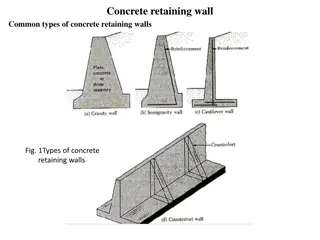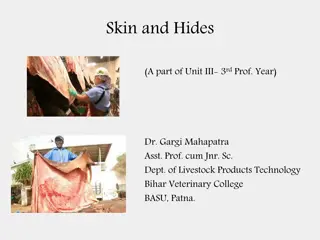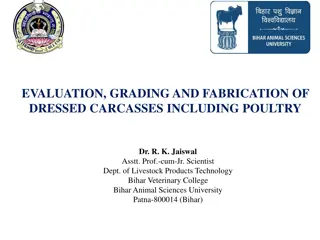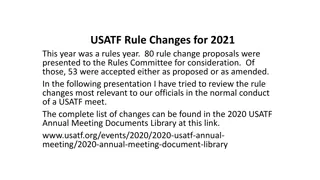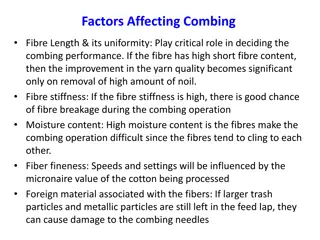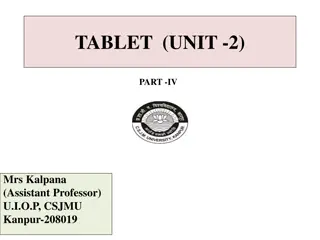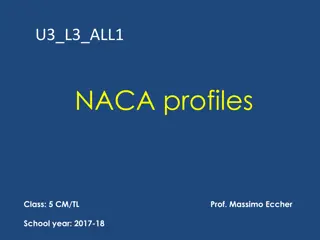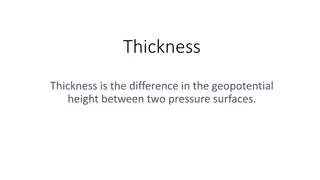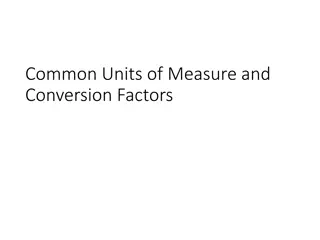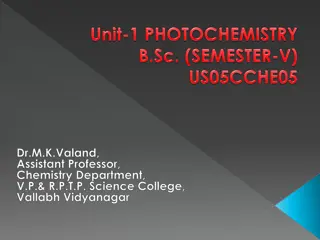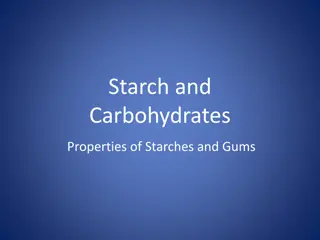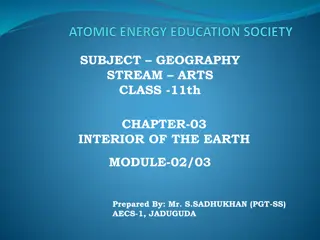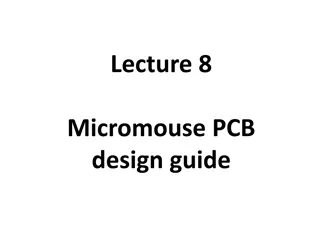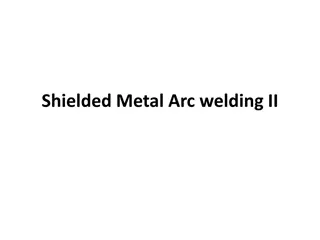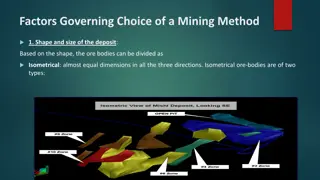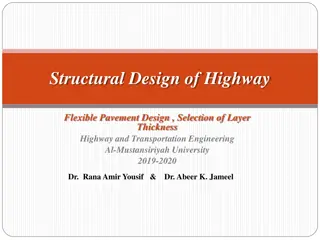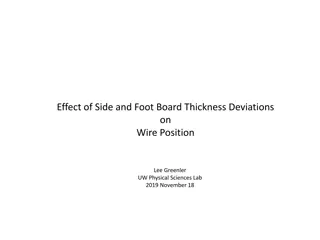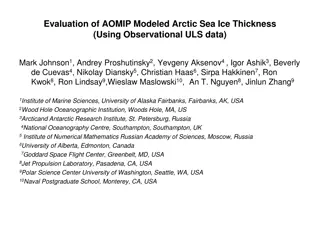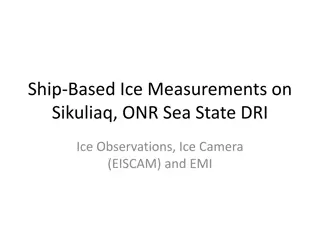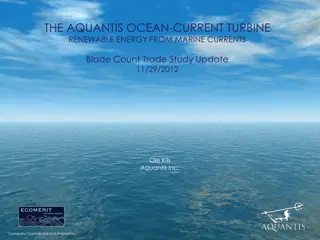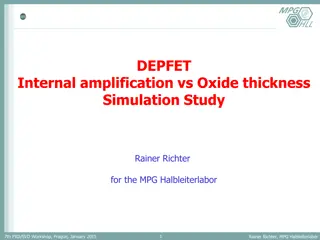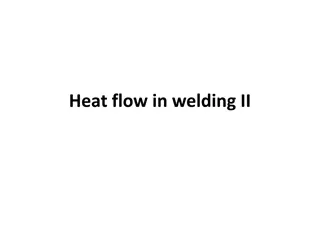BOPP Wrap Around Labels Manufacturer in India
Wrap around labels are roll fed labels available in oriented poly proplyene in pearlised white opaque or natural transparent. We offer oriented polypropylene roll fed labels for 360 degree, full body wrap around labeling of carbonated soft drinks, pet water bottles, beverage, coffee and food product
1 views • 6 slides
BOPP Wrap Around Labels Manufacturer in India
Wrap around labels are roll fed labels available in oriented poly proplyene in pearlised white opaque or natural transparent. We offer oriented polypropylene roll fed labels for 360 degree, full body wrap around labeling of carbonated soft drinks, pet water bottles, beverage, coffee and food product
0 views • 6 slides
Concrete retaining wall
Cantilever retaining walls are commonly used in various scenarios, such as for low walls, limited backfill zones, and urban areas. This type of retaining wall design requires careful consideration of key elements like stem and base thickness, wall pressure for stability, and moment arms for structur
3 views • 10 slides
ENAMEL
Enamel, the hardest calcified tissue in the human body, forms a protective covering over the teeth, adapting them for mastication. Its thickness varies across different surfaces of the teeth, with maximum thickness found on cusps. The structure of enamel makes it brittle, especially when it loses su
2 views • 46 slides
From Packaging to Prototyping: How HDPE Sheets Are Transforming Industries
In the realm of industrial materials, High-Density HDPE sheet thickness sheets have emerged as a versatile and reliable solution with applications spanning from packaging to prototyping. Their unique combination of properties makes them indispensable in various industries, revolutionizing processes
8 views • 4 slides
MANUFACTURERS OF SHRINK & & BOPP WRAP AROUND LABELS
Wrap around labels are roll fed labels available in oriented poly proplyene in pearlised white opaque or natural transparent. We offer oriented polypropylene roll fed labels for 360 degree, full body wrap around labeling of carbonated soft drinks, pet water bottles, beverage, coffee and food product
0 views • 3 slides
Quality Control in Tablet Manufacturing: Ensuring Product Excellence
Quality control in tablet manufacturing is essential to ensure that each tablet meets the required standards. The Quality Control (QC) department plays a crucial role in sampling, testing, and documentation throughout the manufacturing process. Various tests, such as weight variation, disintegration
1 views • 26 slides
Understanding Malignant Melanoma: Types, Signs, and Prognosis
Malignant melanoma is a serious skin cancer with various types, including superficial spreading, nodular, acral lentiginous, lentigo maligna, and amelanotic. Recognizing early signs such as ABCDEF (Asymmetry, Borders, Colour, Diameter, Evolving, Funny-looking) is crucial for prompt diagnosis. Macros
2 views • 25 slides
Principles of Traffic Demand Analysis and Highway Demand Forecasting
Understanding traffic flows is crucial in designing highways and managing traffic effectively. Traffic demand analysis involves forecasting future traffic volumes, modeling demand, and determining the necessary infrastructure improvements. This analysis helps in estimating axle loadings, pavement th
0 views • 36 slides
Understanding Boxplots and Identifying Outliers in Quantitative Data Analysis
Learn how to interpret boxplots, identify outliers using the 1.5 x IQR rule, and compare distributions of quantitative data. Explore examples like Barry Bonds' home run records and tablet thickness measurements to enhance your statistical analysis skills.
0 views • 21 slides
Thermoforming: Plastic Products Production Process and Applications
Thermoforming is a versatile process used to produce various plastic products such as packaging, bathtubs, and interior liners. It involves heating a thermoplastic sheet, shaping it using molds, and cooling the final product. Advantages include flexible design options and low production costs, but t
0 views • 32 slides
Understanding the Importance of Skin and Hides in Livestock Industry
Skin and hides are crucial by-products of large and small animals, with differences in thickness and weight. They are sourced from slaughtered and fallen animals, processed through drying, tanning, and conditioning to produce leather. Leather has outstanding strength, flexibility, and weather insula
0 views • 16 slides
Overview of Carcass Evaluation and Grading in Livestock Processing
Carcass evaluation and grading are vital processes in the marketing and merchandizing of livestock carcasses. Dr. R. K. Jaiswal, a knowledgeable Asstt. Prof.-cum-Jr. Scientist, delves into the significance of evaluation, dressing percent, carcass length, back fat thickness, ribbing, loin eye area, a
1 views • 24 slides
Understanding Cotter Joints in Mechanical Engineering
Explore the applications, design criteria, and failure modes associated with cotter joints in mechanical systems. Learn about the design procedure, thickness determination, and various types of cotter joints. Discover how cotter joints play a crucial role in connecting components in machinery, ensur
3 views • 30 slides
Important USATF Rule Changes for 2021
USATF implemented significant rule changes in 2021, with accepted proposals covering various aspects of athletics competitions. Key updates include sole thickness regulations for athlete shoes, false start management, trial time allowances, throwing event rules, and considerations for mixed age grou
1 views • 12 slides
Factors Affecting Combing Fibre Length & Uniformity in Textile Industry
Play a critical role in deciding the combing performance. Factors include short fibre content, fibre stiffness, moisture content, fiber fineness, and foreign material. Material preparation such as fiber parallelization, sheet thickness, and evenness is crucial. Machine conditions, speeds, operation,
0 views • 11 slides
Quality Control Tests for Tablet Production
Quality control tests play a crucial role in ensuring the safety and efficacy of tablet products. This article discusses various parameters like general appearance, size, shape, unique identification markings, organoleptic properties, hardness, friability, weight variation, and content uniformity th
1 views • 11 slides
Understanding Water Jet Machining in Advanced Manufacturing Processes
Water jet machining (WJM) is a cutting-edge manufacturing process where a high-velocity water jet is used to erode materials rapidly. This method involves directing a high-pressure, high-velocity water jet onto the workpiece surface, forming cavities by eroding the material. The system includes comp
5 views • 42 slides
Understanding NACA Airfoil Profiles and Design Principles
The National Advisory Committee for Aeronautics (NACA), precursor to NASA, revolutionized airfoil design with its systematic approach and NACA airfoil naming convention. Learn about the significance of NACA codes in generating precise airfoil shapes, including examples like the NACA four-digit serie
1 views • 9 slides
Understanding Metric Systems and Significant Figures
Scientists worldwide use the SI system to communicate clearly, based on units like meter, gram, and liter. Learn about base and derived units, SI base units like second and kilogram, and derived units like volume. Discover which unit (millimeter, centimeter, meter, or kilometer) to use for different
0 views • 36 slides
Understanding Atmospheric Thickness and Its Applications
Atmospheric thickness refers to the difference in geopotential height between two pressure surfaces, which is dependent on the mean virtual temperature of the layer in between. This concept plays a key role in determining temperature gradients, identifying fronts, and aiding in weather forecasting,
0 views • 11 slides
Common Units of Measure and Conversion Factors
Area measurements in square inches, square feet, square meters, square kilometers, square yards, and weight conversions between pounds, kilograms, metric tons. Learn about basis weight, converting weight to area, converting area to weight, and measuring thickness in mils, microns, and points. Helpfu
0 views • 7 slides
Understanding Tectonic Plates and Earth's Layers
Explore the composition of Earth's layers through classifying them based on chemical and physical properties. Learn about the lithosphere and its role, including the movement of tectonic plates on the asthenosphere. Discover the distinctions between oceanic and continental plates, their thickness va
1 views • 22 slides
Advantages and Requirements of Underground Cables
Underground cables offer advantages like better protection from damage, fewer faults, and improved appearance. However, they come with higher installation costs and insulation challenges at high voltages. Requirements include using high-conductivity stranded copper or aluminum conductors, proper ins
0 views • 22 slides
Understanding Photochemical Reactions in Chemistry
Photochemistry is the study of chemical effects produced by light radiation. It involves different types of chemical reactions such as photochemical and thermal reactions, each influenced by various factors like light, temperature, and catalysts. This article explores the differences between thermoc
0 views • 17 slides
Structural Design for Host Mall - Commercial Building Overview
This detailed content presents the structural design considerations for a commercial building called Host Mall located in Ramallah city. It covers various aspects including material properties, structural system, load transfers, preliminary design calculations, and slab thickness evaluation.
1 views • 37 slides
Understanding Starch and Carbohydrates in Food Science
Explore the properties of starch and gums, the characteristics of starches like amylose and amylopectin, important processes such as gelatinization and retrodegradation, factors affecting starch gelatinization, and a lab experiment to investigate the factors impacting the thickness of cooked starch
0 views • 14 slides
Journey to the Center of the Earth: A Geographical Exploration
Delve into the intricate layers of the Earth's interior, from the solid crust to the molten mantle and the metallic core. Explore the composition, thickness, and characteristics of each layer, revealing the fascinating mysteries beneath our feet.
0 views • 13 slides
Micromouse PCB Design Guide
This guide provides step-by-step instructions for designing a PCB for a micromouse. It covers components placement, sensor positioning, trace thickness, and trace style to optimize the performance of the micromouse. Proper positioning of components and sensors is crucial, along with considerations f
0 views • 22 slides
Welding Current Selection and Electrode Factors in Shielded Metal Arc Welding
When selecting the welding current for Shielded Metal Arc Welding (SMAW), considerations such as plate thickness, cable length, arc initiation ease, arc blow, and welding position play crucial roles. Direct Current (DC) is preferred for thin sheets and odd position welding, while Alternating Current
0 views • 10 slides
Understanding Gases and Plasmas in the Atmosphere
Delve into the concepts of gases and plasmas in the atmosphere, exploring topics such as fluid pressure, buoyancy, and the unique properties of gases compared to liquids. Discover how the balance between kinetic energy and gravity determines the thickness of our atmosphere and why it is essential fo
0 views • 25 slides
Factors Influencing Mining Method Selection
Factors affecting the selection of a mining method include the shape and size of the deposit, the deposit's contact with country rock, thickness of the ore body, and the dip of the deposit. The shape of the deposit, contact with country rock, and thickness of the ore body impact the feasibility and
0 views • 14 slides
Selection of Layer Thickness in Highway Flexible Pavement Design
Selection of layer thickness for highway flexible pavement design involves determining an initial pavement structure's design structural number and then choosing appropriate thicknesses to meet or exceed the required structural number. Cost-effectiveness, construction constraints, and maintenance co
0 views • 11 slides
Impact of Board Thickness Deviations on Wire Displacement
In this study by Lee Greenler at UW Physical Sciences Lab, the effect of side and foot board thickness deviations on wire position was analyzed. The displacement of the wire was found to vary based on the cosine factor, with potential displacements up to ~0.5mm near the pin. Different cases were con
0 views • 5 slides
Evaluation of Arctic Sea Ice Thickness Using AOMIP Model and ULS Data
This study evaluates Arctic sea ice thickness utilizing AOMIP modeled data and observational ULS data. The comparison includes ice thickness from models, linear regressions, histogram differences, correlations, and model issues. Location comparisons and model versus observation thickness variances a
0 views • 42 slides
Comprehensive Ship-Based Ice Measurements and Observations on Sikuliaq for Sea State DRI
This collection of images showcases various ship-based ice measurements and observations conducted on the research vessel Sikuliaq for Sea State DRI. The images include aspects such as sea ice observations, snow and ice thickness measurements, evaluation of orthorectification, and new snow and ice i
0 views • 8 slides
Aquantis Ocean Current Turbine Renewable Energy Analysis
An update on a trade study regarding blade count for Aquantis ocean current turbine, discussing ideal hydrodynamic and structural models, calculation approaches, and preliminary results. The study explores the effect of thickness-to-chord ratio on rotor section weight and spar thickness for two- and
0 views • 10 slides
DEPFET Internal Amplification vs. Oxide Thickness Simulation Study by Rainer Richter
The study explores the behavior of DEPFET internal amplification in comparison to oxide thickness through simulations conducted by Rainer Richter at the MPG Halbleiterlabor workshop. It delves into the differences in behavior between DEPFET and classical MOS transistors, shedding light on the reason
0 views • 11 slides
Effective Compaction Techniques for Civil Engineering Projects
Understanding the variables involved in soil compaction operations is crucial for developing a successful compaction plan. Factors such as soil moisture content, lift thickness, number of passes, ground contact pressure, compactor weight, and speed play key roles in achieving optimal compaction resu
0 views • 42 slides
Welding Heat Flow and Cooling Rate Calculations
Understanding welding heat flow and cooling rate calculations is essential for determining the critical cooling rate in welding processes. Factors such as plate thickness, number of passes, and relative plate thickness play a crucial role in selecting the appropriate equations for calculating coolin
0 views • 10 slides


